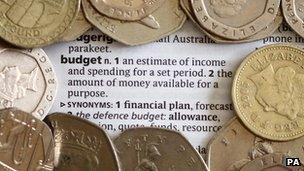Top and bottom tax tensions
- Published

Much of the focus on the Budget has been on the top rate and starting threshold for tax
The unprecedented heavy trailing of the Budget is not because Whitehall has sprung leaks by accident.
It's a consequence of coalition politics, with both Conservative and Liberal Democrat apparently happy to air their differences in public.
In political terms, the Lib Dems have done rather better than over the past two years, when they've failed to get much traction in persuading people they're making a difference.
The junior partners are claiming credit for raising the starting threshold of tax towards their £10,000 target for this parliament, and apparently they're doing it faster than previously planned.
If you read the polls, the Tory side of the coalition government has volunteered to get on the wrong side of public opinion, at least on the question of tax.
Conservatives have allowed themselves to be painted into representation of people earning more than £150,000 a year, with the party's MPs pushing George Osborne to cut the 50p tax rate introduced by Labour Chancellor Alistair Darling.
Part of that is a tactical manoeuvre, aimed at forcing Labour to say if it would raise the top rate tax - not somewhere New Labour would ever have wanted to be, but it seems like a position with which Ed Miliband and Ed Balls would probably be more comfortable.
But defending the interests of the wealthy and those on very high income seem an odd place to want to be, given the "all in this together" rhetoric that got David Cameron elected.
Two polls published recently suggested that about two-thirds of people disagreed with lowering top rate in the short term, though the opposition was lower for top rate tax cuts in the longer term.
Spending pain
That question of top rate tax and bottom rate thresholds has been the focus of much of the pre-Budget positioning. So it's worth remembering what's not been mentioned.
BBC Radio Scotland's coverage on Budget morning found workers happy enough to see a rise in the starting threshold for tax, but they're also wanting to see VAT down from 20p, and a halt to the planned increase in fuel duty this August.
The focus on top rate and starting threshold have allowed much less pressure to be exerted on either of these other issues.
It's also allowed the Budget process to face much less pressure on the spending side of the equation. We're told the tax cuts will not mean an increase in borrowing. They'll have to be matched with higher tax take through more effective collection or by spending cuts.
And that's when spending cuts are already ferocious and unprecedented in their depth, with much of the pain yet to come. It looks like the pain from the consolidation of the UK's public finances is being weighted even more heavily towards spending rather than tax measures.
Balancing up the taxation and spending sides of the nation's ledger will be part of the more balanced picture we can expect as the detail emerges and unravels from George Osborne's third Budget.